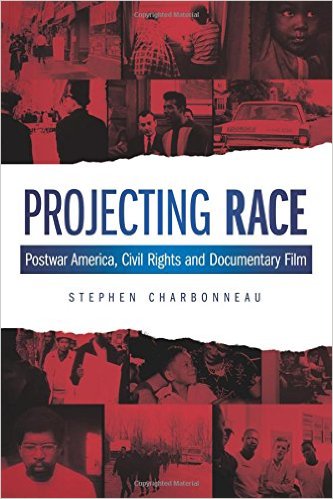CHARBONNEAU PUBLISHES FIRST BOOK-LENGTH STUDY, PROJECTING RACE
by Arts and Letters | Wednesday, May 16, 2018
Dr. Stephen Charbonneau, Associate Director of the School of Communication and Multimedia Studies, published his first book-length study, entitled Projecting Race: Postwar America, Civil Rights, and Documentary Film , in the Spring of 2016 with Wallflower Press. Dr. Charbonneau has been teaching film and media studies, with a main emphasis in documentary film and theory, at FAU as an Associate Professor since Fall 2007, and he started his position as Associate Director in 2015.
Projecting Race inspects documentary filmmaking in the postwar era, and pays particular attention to the way these documentaries deal with race. The project's theme grew out of Dr. Charbonneau's dissertation work at UCLA, and evolved into a much deeper exploration, leading him to visit 56 different archives and to conduct multiple in-person interviews. Through this in-depth study, Charbonneau sought to fully "understand what happened," as he pieced together scraps of film and bits of information to create a comprehensive, final product. What's especially fascinating about documentary films, Charbonneau identifies, is that they "don't have a fixed meaning," and are ultimately more participatory in nature. When it came to the topic of race, however, Charbonneau was able to identify a clear arc in the evolution of the genre, particularly when directors of non-white backgrounds began to take on larger roles in production.
A major draw for Dr. Charbonneau in his research is the participatory aspect of documentary cinema, and the way that it invites an interaction between the filmmaker and the subject in the film. Such participation, he emphasizes, helps in "getting rid that voice of god" often found in classic documentaries. In Projecting Race, Charbonneau emphasizes the aesthetic value of educational documentaries, and how their participatory nature helps to both intensify the viewer's experience and to create a more therapeutic environment. Charbonneau reviews films ranging from Sidney Meyers' The Quiet One (1948) to community development films made years later, including The Farmersville Project (1968) and The Hartford Project(1969).
Dr. Charbonneau is also a fellow for the Peace, Justice, and Human Rights Initiative. He is currently working on an anthology collection with FAU professor Chris Robé on media activism, and he is also interested in the legacy of cinema in new media and how participatory media is evolving outside of cinema.